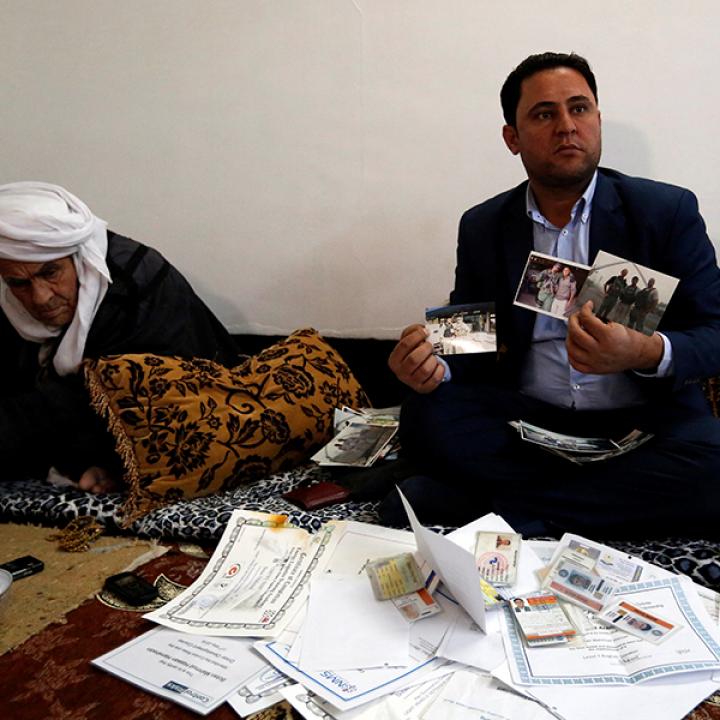
- Policy Analysis
- PolicyWatch 2765
Middle Eastern Reactions to the U.S. Travel Ban

As the Trump administration prepares to revise its controversial entry restrictions, a sampling of quotes from officials around the region indicates that certain provisions will be a hard sell abroad.
President Trump's January 27 executive order on "Protecting the Nation from Foreign Terrorist Entry into the United States" drew much ire at home and around the world. The order's provisions -- which bar entry by all refugees for four months, by all visitors from Iran, Iraq, Libya, Somalia, Sudan, and Yemen for three months, and by all applicants from Syria indefinitely -- spurred massive protests at airports where people were being detained. Following a Seattle federal court decision halting implementation, the president stated that he will issue a revised order targeting the same seven countries; the new text will reportedly try to sidestep further legal challenges by permitting entry to nationals from those countries who already have permanent green cards or visas.
Whatever the case, foreign leaders overwhelmingly condemned the original order, including some stinging comments from officials in the targeted countries. Yet certain leaders responded with passive acceptance, while major authorities in Somalia declined to comment.
IRAQ
- "We will not do anything of the sort [referring to the possibility of a reciprocal ban]. We are studying decisions but we are in a battle and we don't want to harm the national interest." (Prime Minister Haider al-Abadi, Al Jazeera, January 31, 2017)
- "It would be arrogance for you to freely enter Iraq and other countries while barring them from entering your country...Therefore you should get your nationals out." (Iraqi cleric Muqtada al-Sadr, Jawabna.com, January 29)
IRAN
- "We thank this new guy in the White House, since he largely did the job we had been trying to do in the past decades: to divulge the true face of the United States. We had been working to show the world the depth of corruption in the U.S. government and...the ruling elite; Trump did it in a few days after coming to the White House. Their claims to human rights are no longer tenable." (Supreme Leader Ali Khamenei, Mehr News, February 7)
- "[Trump] is new to politics. He has been in a different world...It will take him a long time and will cost the United States a lot, until he learns what is happening in the world. Today is not a time for separating nations by walls." (President Hassan Rouhani, Reuters, February 1)
- "The Muslim ban will be recorded in history as a great gift to extremists and their supporters. Collective discrimination aids terrorist recruitment by deepening fault lines exploited by extremist demagogues...The Muslim ban shows the baselessness of Washington's claim that it wants friendship with the Iranian people and that it only has issues with the government. While respecting Americans and differentiating between them and hostile U.S. policies, Iran will take reciprocal measures to protect its citizens. (Foreign Minister Mohammad Javad Zarif, Twitter, January 29)
SUDAN
- "The Ministry of Foreign Affairs...regrets the inclusion of Sudanese citizens in the executive order...Recently, economic and financial institutions, bankers, and workers from the two countries have initiated communication, launching investment and trade projects to harness the tremendous human, natural, and economic resources of both countries...The [recent] decision to lift U.S. sanctions on Sudan...is the result of extensive bilateral engagement between the two countries, particularly in the area of combating terrorism...Sudan calls for the immediate removal of its name from the U.S. list of State Sponsors of Terrorism and its designation as a Country of Particular Concern...The Ministry of Foreign Affairs...affirms Sudan's policy of constructive bilateral relations and will continue its dialogue with the U.S. government and cooperation with relevant official bodies. (Foreign Ministry website, January 28)
YEMEN
- "The Foreign Ministry said that attempts to classify Yemen or its citizens as a possible source of terrorism are illegal and illegitimate...The ministry...is aware that such action is a sovereign right of the United States...[but] it needs more assessment and revision. The ministry called on the United States to deal with Yemeni citizens in accordance with the standard process adopted with all...friendly countries, and not to consider them as a source of concern or risk or affect their interests or legal status inside or outside U.S. territories." (Summary of Foreign Ministry statement, Yemen News Agency, January 30)
- "The ban...should be lifted for dual nationals, Yemenis with business interests or family ties, and for students in the United States...Yemen is suffering, like other countries, from terrorism and making efforts to confront and eradicate terrorism." (President Abdu Rabu Mansour al-Hadi, direct and indirect remarks during a meeting with U.S. ambassador Matthew Tueller, as reported by al-Monitor, February 2)
LIBYA
- "[This is] an unjust decision [that should be reviewed]...These actions represent racial discrimination on the basis of religion and are incompatible with human rights." (Government of National Accord foreign minister Mohamed Siala, Libya's Channel, February 1)
SYRIA
- "It's against the terrorists that would infiltrate some of the immigrants to the West. And that happened...in Europe, mainly in Germany. I think the aim of Trump is to prevent those people from coming. It is not against the Syrian people." (President Bashar al-Assad, Europe 1 radio, February 16)
This compendium was prepared by Yousif Kalian.


